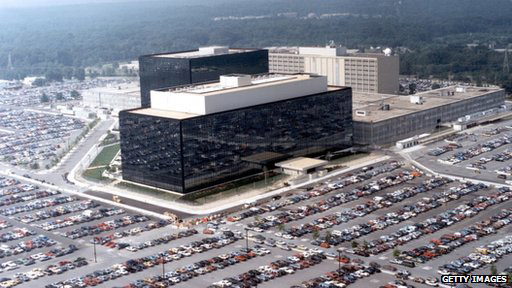
|
The US National Security Agency is building a quantum computer to break the encryption that keeps messages secure, reports the Washington Post. The NSA project came to light in documents passed to the newspaper by whistle-blower Edward Snowden. The spying agency hopes to harness the special qualities of quantum computers to speed up its code-cracking efforts. The NSA is believed to have spent about $80m (£49m) on the project but it has yet to produce a working machine. If the NSA managed to develop a working quantum computer it would be put to work breaking encryption systems used online and by foreign governments to keep official messages secure, suggest the documents excerpted in the Post. The quantum computer is being developed under a research programme called Penetrating Hard Targets and is believed to be conducted out of a lab in Maryland. Many research groups around the world are pursuing the goal of creating a working quantum computer but those developed so far have not been able to run the algorithms required to break contemporary encryption systems. Current computers attempt to crack encryption via many different means but they are limited to generating possible keys to unscramble data one at a time. Using big computers can speed this up but the huge numbers used as keys to lock away data limits the usefulness of this approach. By contrast, quantum computers exploit properties of matter that, under certain conditions, mean the machine can carry out lots and lots of calculations simultaneously. This makes it practical to try all the possible keys protecting a particular message or stream of data. The hard part of creating a working quantum computer is keeping enough of its constituent computational elements, called qubits, stable so they can interact and be put to useful work. The NSA is not believed to have made significant breakthroughs in its work that would put it ahead of research efforts elsewhere in the US and Europe. However, the documents passed to the Post by Edward Snowden suggest the agency's researchers are having some success developing the basic building blocks for the machine. |
据《华盛顿邮报》报道,美国国家安全局正在研发一款用于破解加密信息的量子计算机。 爱德华•斯诺登向《华盛顿邮报》提供了相关的秘密文件,美国国家安全局的该项目由此曝光。 美国国家安全局希望利用这种特殊的量子计算机加快其密码破解工作。 据信美国国家安全局已为该项目投资了约8000万美元(约合4900万英镑),但仍未生产出一台能够工作的机器。 据《华盛顿邮报》引用的文件透露,如果美国国家安全局成功研发了量子计算机,那么它将会被投入到破解网络上和外国政府用来保障官方信息安全的加密系统。 美国量子计算机研发项目被称命名为“攻克难关”(Penetrating Hard Targets),据说该项目正在马里兰州的一个实验室内进行。 世界上许多科研小组都志在研发一台可工作的量子计算机,但他们至今一直无法成功运行破解现在加密系统所需要的算法。 目前的计算机尝试通过许多不同的方法来破解加密,但它们产生的可能的密钥只能在同一时间内解密一个数据。使用大型计算机可以加速这个过程,但使用庞大的数字来作为密码将数据加密使得这种方法的有效性大打折扣。 相比之下,量子计算机利用物质的属性,在一定条件下,这就意味着它可以同时进行很多很多的计算。事实上,这就使得其可以尝试所有破解保护某个特定消息或数据流的密码。 研发可工作的量子计算机的难点在于,如何保持被称为“量子比特”的计算要素足够稳定,使他们能够运行并付诸有益的工作。 美国国家安全局对于量子计算机的研发被认为并没有取得显著的突破,并没有使其能够领先于美国和欧洲其他地方的研究工作。然而,由爱德华•斯诺登透露给《华盛顿邮报》的文件却表明,该机构的研究人员在研发量子计算机基本的组装模块方面已取得了一些进展。 (译者 Chelseyxue 编辑 丹妮) |